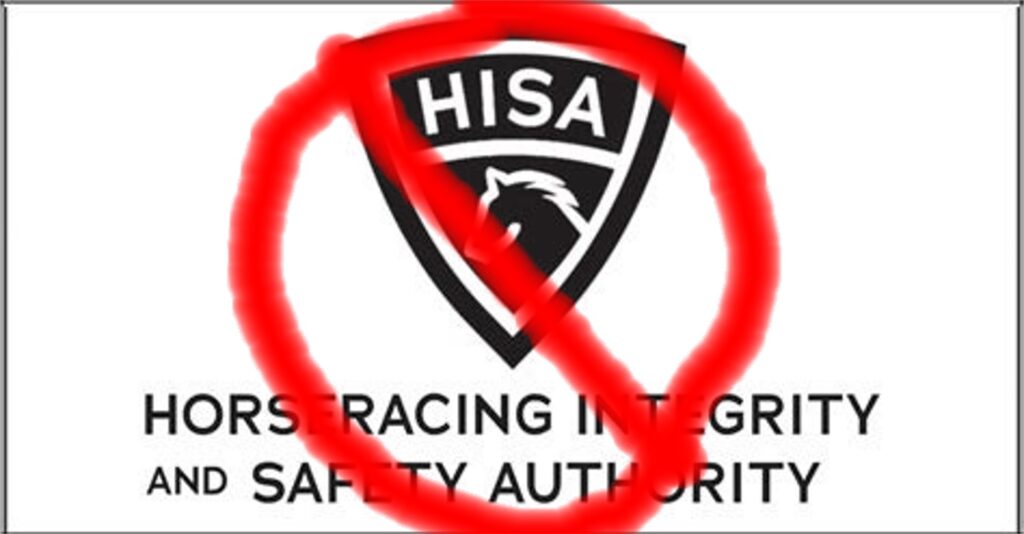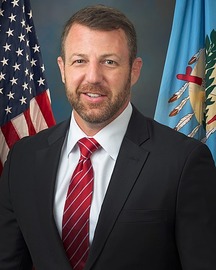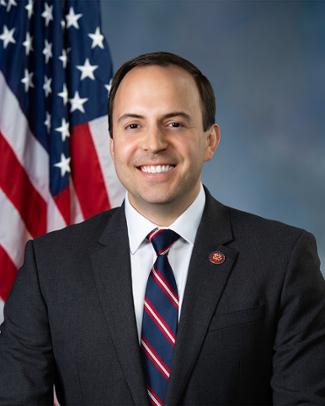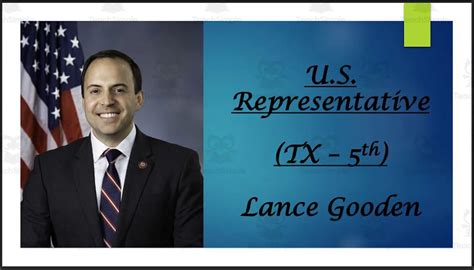There is a common disagreement regarding both the constitutionality of HISA and, it’s reach.

Congressman, Lance Gooden, stood on the floor of the Senate and Sounded the ALARM AT THE DOOR that the, “Horseracing Integrity and Safety Act“, was found unconstitutional by the Fifth Circuit Court of Appeals on November 18, 2022.
The court concluded:
“By delegating unsupervised government power to a private entity, HISA violates the private non-delegation doctrine.
SOURCE
We therefore DECLARE that HISA is unconstitutional on that ground.
The district court’s decision is REVERSED and the case is REMANDED for further proceedings consistent with this opinion.”
(Furthermore,)
“… the court conceded that, unlike the agencies examined in any
other private non-delegation case, the FTC lacked any power “to formally modify the Authority’s rules.” Id. at *23. But this was “not fatal” to the Act’s constitutionality, because relevant precedents did not turn on the agency’s power to modify the private entity’s rules, only on its power to “approve or disapprove” them …”
Here is what Congressman Gooden had said:
“Mr. Speaker, I rise today in opposition to the
SOURCE
unconstitutional Horseracing Integrity and Safety Authority (HISA).
During the 117th Congress, I filed an amendment to the omnibus spending bill to strip language from the bill that had been intended to “fix” the Horseracing Integrity and Safety Act, which was found
unconstitutional by the Fifth Circuit Court of Appeals on November 18, 2022, because Congress had unlawfully delegated its lawmaking power to a private corporation called the “Authority”. The Appeals Court said the Authority needed more oversight from the Federal Trade Commission (FTC), but the language included in the omnibus had been hastily put together and failed to address the underlying issue raised by the Appeals Court. The so-called “fix” still did not allow the FTC to make policy decisions. The FTC still may only reject rules proposed by the Authority if they are inconsistent with the Act, but the Act is written so broadly that no rule will ever be rejected. After the rules have gone into effect, the FTC may now issue its own rules, but it still may do so only to make them consistent with the Act. It cannot impose its own policy decisions on the Authority’s rules. Unfortunately, my amendment did not receive a vote in this era of governing by omnibus, but I will be working this Congress to pass legislation through regular order that will fix the constitutional
problems with HISA.”
TITLE VII–FEDERAL TRADE COMMISSION OVERSIGHT OF HORSERACING INTEGRITY
AND SAFETY AUTHORITY
SEC. 701. FEDERAL TRADE COMMISSION OVERSIGHT OF HORSERACING
INTEGRITY AND SAFETY AUTHORITY.
Section 1204(e) of the Horseracing Integrity and Safety Act of 2020
(15 U.S.C. 3053(e)) is amended to read as follows:
“(e) Amendment by Commission of Rules of Authority.–The
Commission, by rule in accordance with section 553 of title
[[Page 136 STAT. 5232]]
5, United States Code, may abrogate, add to, and modify the rules of the
Authority promulgated in accordance with this Act as the Commission
finds necessary or appropriate to ensure the fair administration of the
Authority, to conform the rules of the Authority to requirements of this
Act and applicable rules approved by the Commission, or otherwise in
furtherance of the purposes of this Act.”.
Congressman Gooden’s words on the record are thus:
“Madam President,
SOURCE
in the early hours of Tuesday morning, we were given the text to the omnibus appropriations bill. With the end of the year fast approaching, everyone is trying to get this bill signed into law quickly. That is true even if it has not been fully reviewed and every consequence thought out. We saw this 2 years ago, when the omnibus was included with COVID-relief funding, within the 2020 omnibus was the Horseracing Integrity and Safety Act. Prior to this 2020 act becoming law, with no process and no opportunity to debate the merits of the act, horseracing was regulated by States, and Congress had no role on how the industry was regulated. What this 2020 bill did was impose a one-size-fits-all Federal regulatory approach on all States, from Iowa to Kentucky, to West Virginia, to New York. This is a bill that had never gone through the committee process, but it managed to end up in the omnibus. As a result of this hasty lawmaking, last month, we saw the Fifth Circuit Court of Appeals strike down the law on the grounds that the act is unconstitutional. Regular order in the Senate, especially through committee process, would have prevented this unconstitutional language.
This did not come as a surprise. It was clear that the private nonprofit Horseracing Authority created in the 2020 omni wielded nearly unlimited Federal rulemaking authority and answered to no one, not even the President of the United States. The court ruled that the power of the Federal Government can be wielded only by the Federal Government, not private entities like the ‘‘Authority.’’ For months I have worked with horsemen in Iowa and my colleagues in the Senate to address the obvious failures with implementation of this law since it went into effect earlier this year. I specifically asked the FTC about the extent of its oversight of the FTC,
a key factor for the Fifth Circuit’s ruling. The FTC response was simple. It said it did not have any oversight over the ‘‘Authority.’’ This is clearly unconstitutional and is inconsistent with conservative principles of small government and reigning in the Federal bureaucracy.
Now that the courts have found HISA unconstitutional, Congress should work a fix through the regular committee process to avoid the pitfalls of the previous legislation.
But that is not what is happening today. In the 2022 omni once again, the special interests that invented the unconstitutional ‘‘Authority’’ in the first place have convinced their supporters a quick fix is needed in this omnibus. The same people who pushed the unconstitutional ‘‘Authority’’ through in an end of year omnibus are once again forcing legislation without any input from Senators like me. This fix to the unconstitutional Federal rulemaking power wielded by the ‘‘Authority’’ is included on page 1,930.
How many members of Congress even know that this is included? Probably very few. I have since introduced an amendment that would strike this text with Senator MANCHIN. Since then numerous
offices reached out to find out what this is—and once they do—have expressed the same opposition to this becoming law that I have.
This is just one example of which there are many, of legislating on an omnibus. It lets a select few Members, or in this case just one Member, of leadership create new Federal regulatory frameworks for entire industries. I support ensuring safe, humane
horseracing. But I also support small tracks, like Prairie Meadows in Iowa, which don’t have the billionaires backing like those in States that host Triple Crown races. And I am not alone because most other States have tracks like Prairie Meadows. Instead of governing this way, Congress should work with State racing commissions to regulate horseracing in a responsible way to ensure racetrack
safety and the economic viability of small tracks across the country.
I will work with any Senator who is willing to stand up for small tracks in the next Congress and fix this broken way of governing.”
H. R. 9132
117th CONGRESS
2d Session
H. R. 9132
To provide an extension of authority for the Horseracing Integrity and Safety Authority.
IN THE HOUSE OF REPRESENTATIVES
October 4, 2022
Mr. Gooden of Texas
(for himself and

3817 NW Expressway #780
Oklahoma City, OK 73112
(405) 246-0025
15 W 6th St. Suite #2100
Tulsa, OK 74119
(918) 921-8520
330 Hart Senate Building
Washington, DC 20510
(202) 224-4721
introduced the following bill; which was referred to the Committee on Energy and Commerce
A BILL
To provide an extension of authority for the Horseracing Integrity and Safety Authority.
Be it enacted by the Senate and House of Representatives of the United States of America in Congress assembled,
SECTION 1. EXTENSION OF AUTHORITY FOR THE HORSERACING INTEGRITY AND SAFETY AUTHORITY.
Section 1202(14) of the Horseracing Integrity and Safety Act of 2020 (15 U.S.C. 3051(14)) is amended by striking “July 1, 2022” and inserting “January 1, 2024”.” SOURCE
Back to where you were reading
nondelegation doctrine
The non-delegation doctrine is the principle that Congress cannot delegate its legislative powers or lawmaking ability to other entities. This prohibition typically involves Congress delegating its powers to administrative agencies or to private organizations. Thus, the non-delegation doctrine is most commonly used in connection with administrative law and constitutional law.
ArtI.S1.5.1 Overview of Nondelegation Doctrine
Article I, Section 1:
All legislative Powers herein granted shall be vested in a Congress of the United States, which shall consist of a Senate and House of Representatives.
The nondelegation doctrine is rooted in certain separation of powers principles.1 In limiting Congress’s power to delegate, the nondelegation doctrine exists primarily to prevent Congress from ceding its legislative power to other entities not vested with legislative authority under the Constitution. As interpreted by the Court, the doctrine seeks to ensure that legislative decisions are made through a bicameral legislative process by the elected Members of Congress or governmental officials subject to constitutional accountability.2 Reserving the legislative power for a bicameral Congress was “intended to erect enduring checks on each Branch and to protect the people from the improvident exercise of power by mandating certain prescribed steps.” 3
The nondelegation doctrine, however, does not require complete separation of the three branches of government, and its continuing strength is the question of much debate.4 In its nondelegation jurisprudence, the Supreme Court has recognized the need and importance of coordination among the three branches of government so long as one branch does not encroach on the “constitutional field” of another branch.5 The nondelegation doctrine seeks to distinguish the constitutional delegations of power to other branches of government that may be “necessary” for governmental coordination from unconstitutional grants of legislative power that may violate separation of powers principles.6Footnotes1See Loving v. United States, 517 U.S. 748, 758 (1996) ( “Another strand of our separation-of-powers jurisprudence, the delegation doctrine, has developed to prevent Congress from forsaking its duties.” ). For discussion of the separation of powers, see Intro.7.2 Separation of Powers Under the Constitution.

2See Immigration & Naturalization Serv. v. Chadha, 462 U.S. 919, 959 (1983) ( “There is no support in the Constitution or decisions of this Court for the proposition that the cumbersomeness and delays often encountered in complying with explicit constitutional standards may be avoided, either by the Congress or by the President. With all the obvious flaws of delay, untidiness, and potential for abuse, we have not yet found a better way to preserve freedom than by making the exercise of power subject to the carefully crafted restraints spelled out in the Constitution.” ) (citations omitted). See also Dep’t of Transp. v. Ass’n of Am. R.R., 575 U.S. 43, 61 (2015) (Alito, J., concurring) ( “The principle that Congress cannot delegate away its vested powers exists to protect liberty. Our Constitution, by careful design, prescribes a process for making law, and within that process there are many accountability checkpoints. It would dash the whole scheme if Congress could give its power away to an entity that is not constrained by those checkpoints. The Constitution’s deliberative process was viewed by the Framers as a valuable feature, not something to be lamented and evaded.” ) (citations omitted); Indus. Union Dep’t, AFL-CIO v. API, 448 U.S. 607, 687 (1980) ( “It is the hard choices, and not the filling in of the blanks, which must be made by the elected representatives of the people. When fundamental policy decisions underlying important legislation about to be enacted are to be made, the buck stops with Congress and the President insofar as he exercises his constitutional role in the legislative process.” ).

3Immigration & Naturalization Serv. v. Chadha, 462 U.S. 919, 957–58 (1983).

4Marshall Field & Co. v. Clark, 143 U.S. 649, 692 (1892); Wayman v. Southard, 23 U.S. (10 Wheat.) 1, 42 (1825).

5J.W. Hampton, Jr. & Co. v. United States, 276 U.S. 394, 406 (1928).

6Id. at 406. See also Chadha, 462 U.S. at 944 ( “[T]he fact that a given law or procedure is efficient, convenient, and useful in facilitating functions of government, standing alone, will not save it if it is contrary to the Constitution. Convenience and efficiency are not the primary objectives—or the hallmarks—of democratic government.” ).

In J.W. Hampton v. United States, 276 U.S. 394 (1928), the Supreme Court clarified that when Congress does give an agency the ability to regulate, Congress must give the agencies an “intelligible principle” on which to base their regulations. This standard is viewed as quite lenient, and has rarely, if ever, been used to strike down legislation.
In A.L.A. Schechter Poultry Corp. v. United States, 295 U.S. 495 (1935), the Supreme Court held that “Congress is not permitted to abdicate or to transfer to others the essential legislative functions with which it is thus vested.”
ArtI.S1.6.5 Private Entities and Legislative Power Delegations
Article I, Section 1:
All legislative Powers herein granted shall be vested in a Congress of the United States, which shall consist of a Senate and House of Representatives.
In contrast to the relative latitude given to delegations to other branches of the government under the “intelligible principle” standard,1 the Supreme Court has limited the types of authority and functions that Congress can delegate to a purely private entity.2 The seminal case addressing delegations to a private entity is Carter v. Carter Coal Co.3 In Carter Coal, the Supreme Court invalidated the Bituminous Coal Conservation Act of 1935, a law that granted a majority of coal producers and miners in a given region the authority to impose maximum hour and minimum wage standards on all other miners and producers in that region.4 The Court reasoned that by conferring on a majority of private individuals the authority to regulate “the affairs of an unwilling minority,” the law was “legislative delegation in its most obnoxious form; for it is not even delegation to an official or an official body, presumptively disinterested, but to private persons whose interests may be and often are adverse to the interests of others in the same business.” 5 The Court did not apply the “intelligible principle” standard, but instead focused on the regulatory and “coercive” power given to private entities over its competitors and the due process concerns raised by such delegations.6
Although Carter Coal concerned the delegation of authority to private entities and not governmental bodies, some courts and commentators have suggested that the Carter Coal decision may more accurately be viewed as a due process case.7 The Fifth Amendment’s Due Process Clause prohibits the Federal Government8 from depriving any person of “life, liberty, or property without due process of law,” 9 which the Court has interpreted as establishing certain principles of fundamental fairness, including the notion that decision makers must be disinterested and unbiased.10 In striking down the delegation to coal producers and miners to impose standards on other producers and miners, the Supreme Court in Carter Coal centered its analysis on the coercive power that the majority could exercise over the “unwilling minority.” 11 The opinion articulated the due process problems involved with providing regulatory authority to private entities, stating:
The difference between producing coal and regulating its production is, of course, fundamental. The former is a private activity; the latter is necessarily a governmental function, since, in the very nature of things, one person may not be entrusted with the power to regulate the business of another, and especially of a competitor. And a statute which attempts to confer such power undertakes an intolerable and unconstitutional interference with personal liberty and private property. The delegation is so clearly arbitrary, and so clearly a denial of rights safeguarded by the due process clause of the Fifth Amendment, that it is unnecessary to do more than refer to decisions of this court which foreclose the question.12
The Court’s reasoning in Carter Coal suggests that delegating authority to coal producers and miners to impose standards on its competitors is in tension with both the nondelegation doctrine and the Due Process Clause.13
After its Carter Coal decision, the Supreme Court did not comprehensively ban private involvement in regulation. In the context of private parties aiding in regulatory functions and decisions, the Court has indicated that Congress may empower a private party to play a more limited and supervised role in the regulatory process. For example, in Currin v. Wallace,14 the Court upheld a law that authorized the Secretary of Agriculture to issue a regulation respecting the tobacco market, but only if two-thirds of the growers in that market voted for the Secretary to do so.15 In distinguishing Carter Coal, the Court stated that “this is not a case where a group of producers may make the law and force it upon a minority.” 16 Rather, it was Congress that had exercised its “legislative authority in making the regulation and in prescribing the conditions of its application.” 17
Similarly, in Sunshine Anthracite Coal Co. v. Adkins,18 the Supreme Court upheld a provision of the Bituminous Coal Act of 1937,19 which authorized private coal producers to propose standards for the regulation of coal prices.20 Those proposals were provided to a governmental entity, which was then authorized to approve, disapprove, or modify the proposal.21 The Court approved this framework, heavily relying on the fact that the private coal producers did not have the authority to set coal prices, but rather acted “subordinately” to the governmental entity (the National Bituminous Coal Commission).22 In particular, the Sunshine Anthracite Court noted that the Commission and not the private industry entity determined the final industry prices to conclude that the “statutory scheme” was “unquestionably valid.” 23
In the same vein as Carter Coal, the Supreme Court in Currin and Sunshine Anthracite did not evaluate whether Congress laid out an “intelligible principle” guiding the delegations to the private entities. Rather than applying the “intelligible principle” standard, the Court reviewed whether the responsibilities given to the private entities were acts of legislative or regulatory authority.24 In these nondelegation cases involving private entities, the Court drew the “line which separates legislative power to make laws, from administrative authority” to administer laws.25 In both Currin and Adkins, the Court reasoned that the private entities did not exercise legislative power because they did not impose or enforce binding legal requirements.26 Because the private entity’s responsibilities were primarily administrative or advisory, the Court determined that the statutes did not violate the nondelegation doctrine.27Footnotes1See ArtI.S1.5.3 Origin of Intelligible Principle Standard.

2See A.L.A. Schechter Poultry Corp. v. United States, 295 U.S. 495, 537 (1935) (holding that delegation to trade and industrial associations of the power to develop codes of “fair competition” for the poultry industry “is unknown to our law and utterly inconsistent with the constitutional prerogatives and duties of Congress” ).


4Id. at 311–12.

5Id. at 311. The Court appeared to characterize the wage and hour provisions as an unlawful “delegation” to a private entity, but also held that the provision in question was “clearly a denial of rights safeguarded by the due process clause of the Fifth Amendment,” id. at 311–12, leading some to question whether Carter should be considered a nondelegation case at all.

6Seeid. at 311 ( “The difference between producing coal and regulating its production is, of course, fundamental. The former is a private activity; the latter is necessarily a governmental function, since, in the very nature of things, one person may not be entrusted with the power to regulate the business of another, and especially of a competitor.” ).

7At least one court has debated on whether Carter Coal is a nondelegation or due process decision. See Ass’n of Am. R.R. v. Dep’t of Transp., 821 F.3d 19, 31 (D.C. Cir. 2016) (explaining that it was unclear what aspect of the “delegation [in Carter Coal] offended the Court. By one reading, it was the Act’s delegation to ‘private persons rather than official bodies. By another, it was the delegation to persons ‘whose interests may be and often are adverse to the interests of others in the same business’ rather than persons who are ‘presumptively disinterested,’ as official bodies tend to be. Of course, the Court also may have been offended on both fronts. But as the opinion continues, it becomes clear that what primarily drives the Court to strike down this provision is the self-interested character of the delegatees’ . . . .” ).

8The Fifth Amendment’s Due Process Clause, by its very nature, only applies to the actions of the Federal Government. See Farrington v. Tokushige, 273 U.S. 284, 299 (1927) ( “[T]he inhibition of the Fifth Amendment—’No person shall . . . be deprived of life, liberty or property without due process of law’—applies to the federal government and agencies set up by Congress for the government of the Territory.” ). For discussion of the Fifth Amendment’s Due Process Clause, see Amdt5.5.1 Overview of Due Process. The Fourteenth Amendment’s Due Process Clause as applied to actions of the states is discussed at Fourteenth Amendment, Section 1.

9U.S. Const. amend. V. See also Marshall v. Jerrico, Inc., 446 U.S. 238, 242 (1980) ( “The Due Process Clause entitles a person to an impartial and disinterested tribunal in both civil and criminal cases.” ); Carter Coal, 298 U.S. at 311; Eubank v. City of Richmond, 226 U.S. 137, 143–44 (1912) (invalidating a city ordinance on the grounds that it established “no standard by which the power thus given is to be exercised; in other words, the property holders who desire and have the authority to establish the line may do so solely for their own interest, or even capriciously. . . . ” ). See Amdt5.5.1 Overview of Due Process.

10See, e.g., Marshall, 446 U.S. at 242.

11Carter Coal, 298 U.S. at 311.

12Id. at 311–12.

13The intersection of the Due Process Clause and the nondelegation doctrine as illustrated by the Court’s decision in Carter Coal may arise when Congress delegates authority to government-created corporations that have both public and private aspects. For example, in Department of Transportation v. Association of American Railroads, the Supreme Court held that “Amtrak is a governmental entity, not a private one” for purposes of reviewing Congress’s power to delegate regulatory authority to Amtrak, a for-profit entity created by Congress. Dep’t of Transp. v. Ass’n of Am. R.R., 575 U.S. 43, 45, 54 (2015). The Court, however, did not reach the issue of whether the delegation of coercive power given to Amtrak over its competitors violates the Due Process Clause or the nondelegation doctrine. Id. at 55–56.


15Id. at 6.

16Id. at 15.

17Id. at 16.


19Pub. L. No. 75–48, 50 Stat. 72 (1937).

20Sunshine Anthracite Coal Co. v. Adkins, 310 U.S. at 388–89.

21Id. at 388.

22Id. at 399.

23Id.

24Id. at 388–89; Currin v. Wallace, 306 U.S. 1, 15–16 (1939).

25United States v. Grimaud, 220 U.S. 506, 517 (1911).

26Sunshine Anthracite Coal Co. v. Adkins, 310 U.S. 381, 388–89 (1940); Currin, 306 U.S. at 15–16.

27Id.




